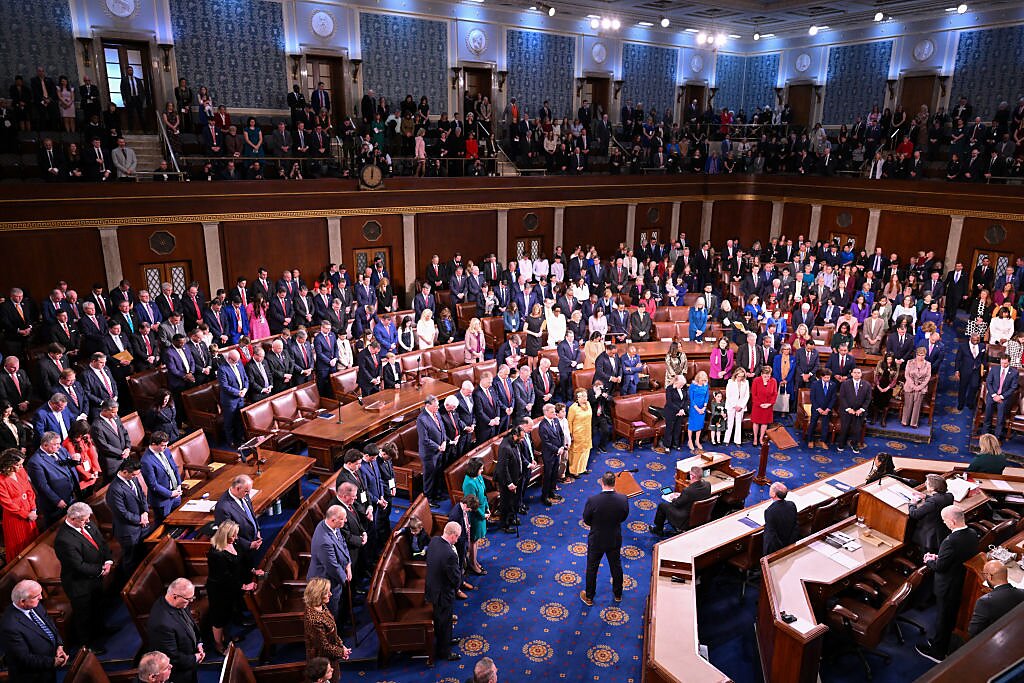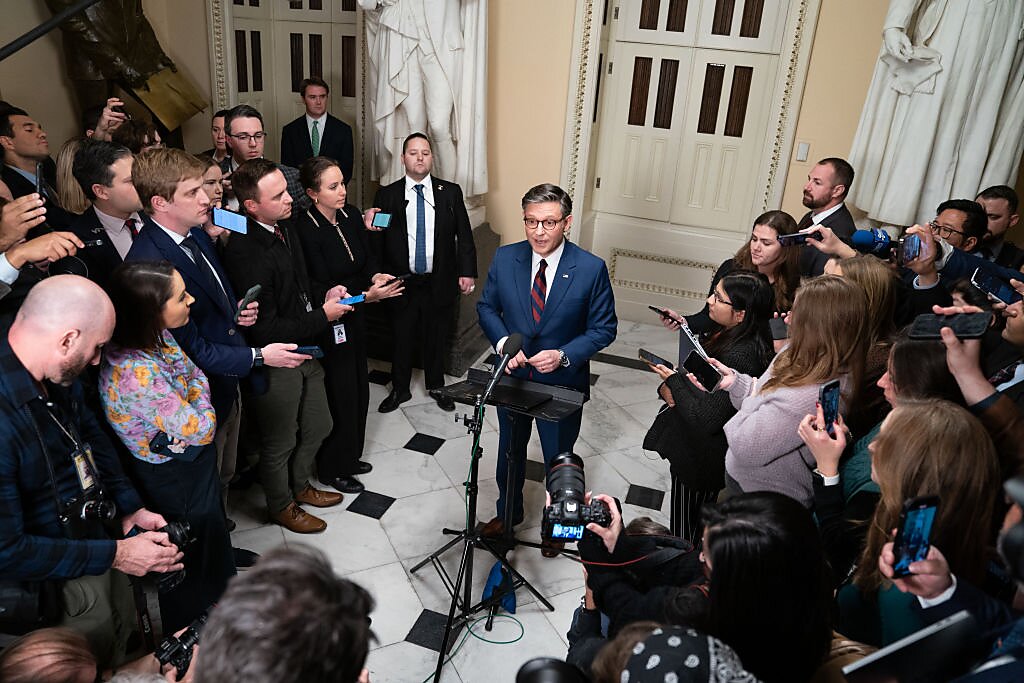As we head into a second Trump presidency, there’s no shortage of speculation about potential constitutional crises. One scenario getting attention is the possibility that Congress could fail to complete the formal counting of electoral votes on January 6, 2025, particularly if the new House of Representatives hasn’t managed to elect a speaker after they convene at noon today, January 3. It’s an understandable concern when Mike Johnson can afford to lose no more than one Republican vote, and a dozen or more are flirting with the possibility of not voting for him.
This raises an important question: Would such a failure leave the presidency vacant on January 20, throwing the nation into uncharted constitutional chaos? Would the order of presidential succession kick in, skipping past a vacant presidency and vice-presidency through the speaker of the House, if there is one, or the Senate president pro tempore, or beyond that to the secretary of state? The short answer is no.
The 12th and 20th Amendments, the Electoral Count Reform Act (ECRA), and the mechanics of the Electoral College itself make clear that Congress’s count is not what makes a person into the president-elect, duly entitled to take office on Inauguration Day. Even if Congress fails to act, Trump and J.D. Vance (setting aside 14th Amendment arguments about Trump’s eligibility) would still take office at noon on January 20, 2025.
Congress’s Role: Recognizing, Not Creating, the Result
The process of counting electoral votes is often misunderstood, with media coverage referring to it as “certifying” the result. It’s easy to think that the joint session of Congress somehow ratifies or finalizes the election. In reality, the count is merely a recognition by Congress of an event that has already happened: the appointment of electors by the states, the meeting and voting of those electors, and their certification of those votes. If a majority of the electors vote for somebody, that person has been elected. The electors, not Congress, are the only people who elect a president, absent the unlikely scenario of a contingent election because the Electoral College has deadlocked.
Under the 12th Amendment, Congress with the vice president presiding is tasked with opening the certificates sent by the Electoral College and counting the votes. But this process doesn’t establish the outcome of the election, it only acknowledges it. The 20th Amendment reinforces this by stating plainly that the president’s term ends at noon on January 20 and the new president’s term begins at that time. The only exception is “if a President shall not have been chosen” or “if the President elect shall have failed to qualify,” neither of which are conditions triggered by Congress failing to conduct the electoral count. A president has already been chosen by the Electoral College, and a failure to conduct the electoral count by Congress is not a failure “to qualify” (i.e., to be eligible) on the part of the president-elect.
The Electoral Count Reform Act of 2022 further clarified that the role of Congress is ministerial. It can resolve disputes about electors only within the narrow framework provided by law, because inherent in the act of “counting” is deciding what to “count.” But even for this purpose, the affirmative vote of both chambers is required to reject the validity of electors or their votes. Without both chambers voting to sustain an objection, the vote certificates are still presumed valid by default. And at the end of the process, there is no “certification” produced.
The VP’s announcement of the final vote count during the joint session follows a script simply saying that it “shall be deemed a sufficient declaration” of the election’s outcome and will be printed in the congressional journal. This language is carefully chosen: sufficient, not necessary. Declaration, which is in form a recognition of an existing reality, not a proclamation or certification or enactment, giving effect to something being newly created.
There is no single formal commission document given to a president by Congress to officially prove their credentials, such as a president signs and provides when appointing all other executive officials or judges. A president’s “commission” in this sense is the combined certificates of the electoral votes cast for them, signed and made by the electors themselves, whose appointments were certified by the states. The existence of those vote certificates is in and of itself sufficient authorization for somebody to legitimately claim the presidency at the constitutionally fixed start of the term.
Congress is merely putting on the record it has been duly informed of the fact. In practice, if there’s a dispute, Congress’s position on who is the real president would be the most important factor, likely decisive. But the lack of such a congressional formality does not nullify the election and its outcome, which exists independent of Congress. The presidency, at the head of its own separate branch of government, and the presidential election, carried out by the Electoral College, both exist independently of Congress.
What Happens If Congress Fails to Count?
So what happens if the House fails to elect a Speaker by January 6, leaving it unable to organize or participate in the joint session for counting electoral votes?
For one thing, there are ways the joint session could still proceed under a number of theories and procedural moves. Arguably, the constitutional and statutory basis of the joint session would supersede the House rules, and allow the clerk to do the part of presiding over the House (which only comes into play during the electoral count if an objection is made by at least one-fifth of both chambers, requiring them to debate and vote separately, otherwise it’s just the VP presiding over the combined joint session). Or more practically, the House could designate a speaker pro tempore for just long enough to swear in all the other members and complete the electoral count, before returning to their deadlocked speaker election. While all these scenarios would be disruptive and not reflect well on the House, even a complete failure to conduct the electoral count would not prevent the constitutional transfer of power.
Under the 20th Amendment, the president’s term expires automatically at noon on January 20. If there’s a president-elect, then that person assumes office at that moment. Elsewhere the 20th Amendment speaks of the scenario where a president-elect has died, heavily implying that “president-elect” is a status that attaches when the Electoral College does the actual electing, not for only the brief fortnight between the count and the inauguration. In common parlance, we speak of a president-elect as soon as the winner of the election is apparent. The word itself, president-elect, refers to when somebody has been elected, not some later date.
This is further confirmed by the language of the 12th Amendment: “The person having the greatest number of votes for President, shall be the President, if such number be a majority of the whole number of Electors appointed.” This is something where the count functions for Congress to find out who got the most votes, and if it was a majority. But this pre-existing fact is not conditional on anything Congress or the vice president does. It’s not “shall be President” only if Congress follows the rest of the procedure, it’s “shall be President” without any further qualification, by the simple fact of their election. Because the Constitution says so, not because Congress says so.
If Congress hasn’t counted the votes, it doesn’t mean there’s no president-elect. It just means Congress failed to perform its duty to formally recognize and record the outcome. In that case, the determination of who won the Electoral College—and therefore who becomes president—rests entirely on the certificates of the electoral votes. Those valid certificates are binding and self-executing even in the absence of congressional action. Any litigation challenging the president’s claim to the office would have to be brought against an actual exercise of presidential powers, and if such a lawsuit cleared the hurdles for standing and jurisdiction and justiciability, a court would be justified in referring to the electoral vote certificates as decisive in the absence of any evidence to the contrary.
This distinction matters because some have floated the idea that a failure to complete the count would create a constitutional power vacuum, potentially allowing the incumbent to remain in office (absolutely not under the 20th Amendment) or throwing succession into question. But that would not be a correct interpretation of the Constitution and statutory provisions. The Electoral College determines the president-elect, and the 20th Amendment mandates the transfer of power to the winner of the Electoral College on January 20, regardless of whether Congress has finished its counting duties.
As a practical matter, a live dispute over the presidency requires somebody to press their claim to the office. On the theory that neither Trump nor Vance can take office on January 20, and if the House has also failed to elect a speaker, the presidential succession would pass to the president pro tempore of the Senate. This is expected to be Sen. Chuck Grassley, by convention the most senior member of the majority party when Republicans retake the Senate majority. If Grassley didn’t claim it (which would require resigning his Senate seat), in theory the secretary of state would be next in line, if Anthony Blinken has not yet resigned, followed by the rest of the Cabinet. In reality, none of these people are likely to make a legally dubious and politically hopeless claim that they’re really the acting president of the United States.
This is not to downplay the risks of political gamesmanship. Failing to elect a speaker and leaving the House paralyzed would be a serious governance failure, undermining faith in Congress’s ability to carry out its most basic responsibilities. But it wouldn’t invalidate the presidential election, and it wouldn’t stop the winners of that election from taking office. The Electoral College result stands, self-executing and automatic, of its own force. Congress cannot defeat the Electoral College outcome by the procedural equivalent of hiding under the covers and insisting they can’t see you.

























